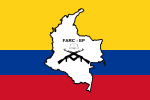
One of the things I've been trying to do more lately is to seriously read and engage the ideas of people and/or groups that I generally disagree with. The American Enterprise Institute has generally been one of those entities because, from my experience, they have generally pushed a military force uber alles approach to foreign policy. That's why I was surprised to read this article from their journal on how COIN lessons taken from the success that Colombia has seen in combating FARC and ELN could be applied to the current situation in Afghanistan.
What surprised me about the article was its minimalist approach. In the past, neoconservative outlets such as AEI have almost invariably advocated a maximalist, all-in, send 8 jillion US troops approach to any given conflict or problem. However, the author of this piece, Haddick, soberly analyzes the similarities and differences between the two conflicts and makes reasonable conclusions regarding applicable lessons that could be applied to the situation.
And here's the kicker...the recommendations are actually quite limited and modest! Haddick recommends an emphasis on quality over quantity in building up Afghan security forces, since this approach worked well against the Colombian insurgents. He also recommends emphasizing helicopters in security assistance to Afghan security forces due to the rough terrain (again, something that worked well for Colombian forces in the rough terrain that they fought in). Finally, he recommends working to develop local security forces since potential soldiers are often loathe to serve far away from their homes.
All of these recommendations are sensible, and the great part is that they don't really require any massive commitment of treasure or personnel on the part of Western governments (although of course the helicopters could be expensive). Score one for the neocon think tank.




